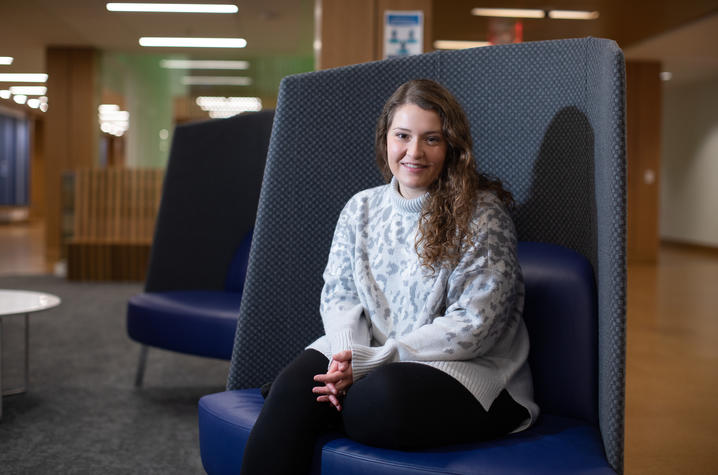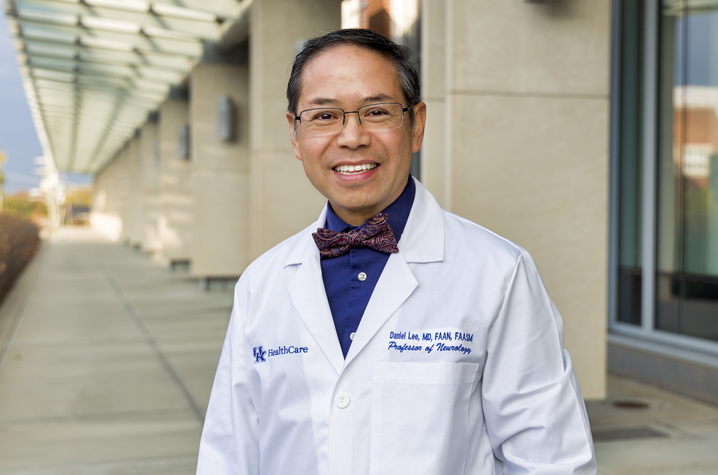UK Law Student Recovering from Severe Neurological Impacts Following COVID-19
LEXINGTON, Ky. (March 17, 2021) — For University of Kentucky J. David Rosenberg College of Law student Shelby Ponder, this past summer was supposed to be focused on serving as a law clerk at the U.S. Attorney’s Office in London, Kentucky. However, instead of being a summer she would never forget due to gaining that prestigious experience, it turned into a defining chapter in her life in which her only focus of every minute was surviving.
“This experience showed me how little I understood of true suffering. I never understood how your health can control every aspect of your life. Without it, I truly felt like I had nothing,” said Ponder.
The Rockcastle County native remembers when COVID-19 started to make its way into the community and plans were put in motion to shut down campus. “My life didn’t change very much then. It was very weird for sure, and I think everyone thought life would return to normal quickly after shutting down for a few weeks. Honestly, I was thrilled to get to be at home for an extended time with my family.”
However, now a year out from that moment in time, Ponder's outlook is different. “My life is completely changed, and I feel that I’m an entirely new person because of it.”
COVID-19 first got its grips on the healthy 23-year-old in June of 2020 after she had direct exposure to a few family members who contracted the virus. Ponder remembers having what seemed like very mild strep throat symptoms and actually testing negative for COVID-19.
With a negative COVID-19 test, Ponder continued working but noticed she was having some trouble completing routine assignments. She remembers staring blankly at her computer screen for hours at a loss for what she should do to complete a task that should be fairly simple for a second-year law student.
“Then the second week of July, I developed the same strep-like symptoms.” With the re-emergence of symptoms, she underwent another COVID-19 test, and once again it came back negative. She says from that point it was like her body and brain snapped. “Everything deteriorated from that point,” she said.
Her fever then spiked and stayed between 103 and 103.9 degrees. With the unrelenting fever not going anywhere, Ponder’s mom took her to a local emergency room. Several tests were done to try to determine if the cause was some type of virus or infection – all of those coming back negative – including coronavirus. As another week of the fever and brain fog passed, they decided to be seen at UK HealthCare’s Emergency Department. With another round of negative tests completed, she returned home with no solid answers.
The fever eventually just went away and Ponder remembers feeling much better, enough so she returned to her job at the U.S. Attorney’s Office. However, when driving home from work that day she noticed her eyes were having trouble staying focused.
“My whole vision field started shaking up and down and left to right,” she remembers. Ponder was unable to see it herself, but others could see her eyes visibly shaking. This new development prompting another trip to seek immediate medical attention. Once arriving at UK HealthCare’s Emergency Department Ponder remembers the doctor looking at her eyes and quickly admitting her to the hospital. From that point it was clear to doctors she was experiencing some sort of neurological setback. They then took her through some basic motor skill tests like touching the tip of her pointer finger to the middle joint in her thumb repeatedly. She couldn’t do that simple task.
An MRI of Ponder’s brain did show extensive swelling. Doctors diagnosed her with post-viral encephalitis. They then ran more tests to look for any viral or bacterial infections that can cause encephalitis, but they were unable to determine a source. “This whole time was quite a bit of a blur because it all happened so fast.” She was released from the hospital with a prescription for several medications including steroids to help with migraines she had been experiencing.
As she got settled back in at home, one particular symptom started to become more than a nuisance – she could not sleep. “The first couple of weeks it was the opposite. I could not wake up when my fever was so high. I was sick and sleeping around the clock. Then one day it just kind of snapped. The insomnia presented at about the same time as the vision problems. I just thought maybe it was because I had been so sick.”
It was a problem that the prescribed steroids were only making worse, “It made me like a maniac. I could not rest.” She says it never crossed her mind that sleep was part of her brain function and could be an indicator of what exactly was going on in her body the past several weeks. After about a week of only getting about 30 minutes of sleep each night, Ponder’s mom called UK’s Department of Neurology. That is when Dr. Daniel Lee, medical director for the Kentucky Neuroscience Institute, got involved. “He truly is a lifesaver,” said Ponder.
Since she already had many tests conducted and scans of her brain on file, Dr. Lee – who specializes in sleep disorders - was able to review those and then meet with her over zoom. “He showed me the parts of the brain and drew a picture to explain how everything works while pointing out what was wrong with my brain. It was really validating because I just thought I was losing my mind,” explained Ponder.
Ultimately, Dr. Lee determined multiple parts of Ponder’s brain were swollen, including her hypothalamus, the area known as the "sleep center." Additionally, her brain wasn’t making melatonin as the receptors the brain uses to accept melatonin were inactive.
During the initial appointment over zoom, Dr. Lee wrote out a nightly medicine routine that Ponder needed to follow, “That night I went from about 30 minutes of sleep to five to six hours of sleep each night.” There were some setbacks with the medication plan that required Dr. Lee to make adjustments during the next several months which Ponder says was her main source of stress at that point, “Just the constant worry of whether I would be able to sleep that night or not.”
She remembers, after weeks of fear over this, the exact moment that source of stress went away during a phone conversation with Dr. Lee. “He said to me, ‘It is not your job to worry about what we need to do next – that is my job! Let me do my job’.”
Dr. Lee also encouraged Ponder to get tested for COVID-19 antibodies even though she had previously tested negative for the virus. The result of that test – positive. Ponder finally felt like she was getting some answers and understanding what exactly her body had endured the past several months.
“Something with neurological illnesses or injuries that I don’t think a lot of people realize, is that just because it is not visible like other illnesses it doesn’t mean it cannot cause your whole world to feel like it is collapsing. It took complete control of my personality and my emotions for many months.”
Ponder says she is extremely grateful she did not have to leave her home region to find a wonderful doctor and believes with total confidence that she would not have found better care anywhere else in the world. “You would be hard-pressed to find a more compassionate or brilliant doctor than Dr. Lee. He was in contact with me almost daily in the early days of this illness and he was so responsive to my concerns.”
Dr. Lee says encephalitis is one of the most devastating neurological disorders around. “It can manifest in so many different ways and it varies among each individual. Some might come down with just headaches, while others can have the inability to speak or control movements, and even seizures,” he explained.
The sleep specialist estimates that about 13% of people who test positive for COVID-19 will have some sort of neurological impact from the virus and are then at risk of developing encephalitis. Dr. Lee says the age and overall health of patients experiencing neurological symptoms post-COVID varies, which in turn makes it hard to say if anything in particular makes someone more at-risk for long-term effects.
Ponder certainly didn’t consider herself as someone at-risk when the pandemic started. “I knew it was a possibility to get COVID-19, but I don’t think anyone ever fathomed COVID-19 could cause these long-lasting effects. I certainly did not.”
Dr. Lee says not everyone makes a full recovery from encephalitis, but he does believe that Ponder’s age, overall health and positive attitude are working in her favor. Routine scans of Ponder’s brain do show gradual improvement. “We are hopeful that Shelby eventually will be doing better and better,” he said.
Ponder says she is not 100% but is getting closer each day and recently successfully stopped taking her last sleep medication, “This is something that I will never be able to forget enduring, and it will undoubtedly always impact the way I view the world, but I am grateful every day for all the recovery I have made.” Her recovery thus far allowing her to resume planning her wedding – something she started to doubt would happen at all. The man she credits with saving her life, Dr. Lee, is invited.
Now as we all pass by the one-year mark of life in a pandemic and see that things have not yet returned to normal, Ponder hopes her story is a reminder that for those most impacted by the virus, life likely never will return to that ‘normal’. She also hopes her story helps those who have not taken the virus seriously to change their outlook.
“I hear the rhetoric quite a bit that people do not want to ‘live in fear'. Hearing that statement takes my breath away. Very few people know what fear truly is; I have known paralyzing fear, a feeling I will never forget for as long as I live. I came to know that fear because I contracted COVID-19. There is very little I would not sacrifice to take that fear away,” she said.
Both Ponder and Dr. Lee hope this story also encourages vaccination. “It is still the most effective tool that we have to prevent encephalitis because prevention is always better than the cure itself,” said Dr. Lee.
As the state’s flagship, land-grant institution, the University of Kentucky exists to advance the Commonwealth. We do that by preparing the next generation of leaders — placing students at the heart of everything we do — and transforming the lives of Kentuckians through education, research and creative work, service and health care. We pride ourselves on being a catalyst for breakthroughs and a force for healing, a place where ingenuity unfolds. It's all made possible by our people — visionaries, disruptors and pioneers — who make up 200 academic programs, a $476.5 million research and development enterprise and a world-class medical center, all on one campus.






